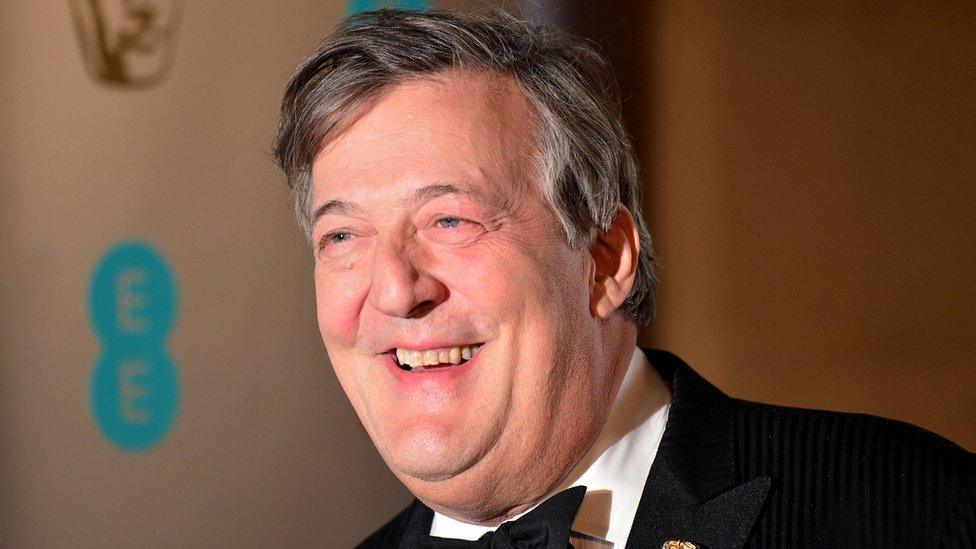In the ever-evolving landscape of public opinion and social justice, can a prominent figure truly remain neutral when faced with conflicting views on deeply personal issues?
Stephen Fry's recent statements regarding J.K. Rowling and transgender rights have ignited a firestorm, underscoring the complexities of navigating public figures' relationships with both controversial figures and marginalized communities.
The controversy began with remarks made by Fry, a beloved actor, author, and public intellectual, concerning the author of the Harry Potter series. Fry revealed that his trans and intersex friends were "deeply upset" by Rowling's comments on transgender people. However, he simultaneously expressed a reluctance to condemn Rowling, advocating instead for both parties to "retreat." This stance has placed Fry squarely in the crosshairs of criticism, particularly within the LGBTQ+ community and among his former admirers.
- Does Orlando Bloom Have A Twin The Surprising Truth
- Secrets Of Undefined Curly Hair Tips Care And Styling
The roots of the current debate trace back to Rowling's statements on gender identity, which many have interpreted as transphobic. These statements, including a blog post in 2020 where she discussed sex and gender, sparked intense debate and accusations of echoing transphobic rhetoric. This has led to a complex web of reactions, ranging from staunch support for Rowling to vehement condemnation, and has drawn in prominent figures like Fry, who now faces the challenge of reconciling his friendships with the author and his support for LGBTQ+ rights.
Fry's decision to voice his views on these issues has led to widespread discussion. He has faced considerable backlash for several key decisions: revoking his support for the LGBTQ+ charity Stonewall, describing their support of trans rights as "nonsensical," and his stated desire not to condemn Rowling for her views. Fry's comments have alienated members of the trans community and disappointed many fans.
The situation has generated a significant ripple effect throughout media and within social circles. Fry's remarks came as Rowling has been repeatedly accused of transphobia. Fry, who narrated the audiobook fairytale The Ickabog by Rowling, has found himself at the center of the controversy, with fans expressing their upset over his continued association with her.
- Unveiling The Net Worth Of Renowned Actor Josh Lucas
- Uncover The Life And Legacy Of Ken Burns A Comprehensive Biography
| Category | Details |
|---|---|
| Full Name | Stephen John Fry |
| Born | August 24, 1957 (age 66) |
| Birthplace | Hampstead, London, England |
| Nationality | British |
| Occupation | Actor, comedian, author, presenter |
| Known for | Acting roles in films and television, writing, presenting documentaries |
| Awards & Honours | Knighthood, BAFTA Awards, Emmy Awards |
| Notable Works | A Bit of Fry & Laurie, QI, The Hitchhiker's Guide to the Galaxy (film) |
| Relationships | Married to Elliott Spencer |
| Website | stephenfry.com |
Fry's involvement with Stonewall is particularly pertinent. He has been a vocal supporter of LGBTQ+ rights throughout his career. However, his recent criticism of the organization, labeling their stance on trans issues as "nonsensical," signals a significant shift and has generated intense debate. Many former fans have expressed feelings of sadness and disappointment, questioning his choices.
The actor's stance has led to intense scrutiny. It raises questions about the role of public figures and the inherent difficulties they encounter when expressing opinions on divisive topics. The public, especially his core audience, finds it difficult to reconcile the image of a LGBTQ+ ally with the decisions he has made. This has triggered widespread discussion and social media commentary on Fry's choices.
Rowlings denial of being transphobic, insisting she does not want to see trans people bullied or marginalized, brings additional nuance. Fry's comments regarding her views and his unwavering friendship further deepen the complexity of the matter. He has expressed his friendship with Rowling and, even as he acknowledged the upset of his friends, seemingly wished for both parties to de-escalate the conflict. This has inevitably brought additional complexity to the situation, including the question of whether it's possible to support both sides of a conflict.
The controversy highlights the ever-evolving nature of identity politics and the often challenging positions individuals find themselves in when their viewpoints clash with the prevailing social sentiment. The discussion also includes the role of free speech and the responsibility one has when speaking about highly sensitive topics. Fry has said he wanted to go on GB News to prove that a 'free speech' model is rubbish.
The debate goes beyond Fry and Rowling, and encompasses the broader landscape of trans rights and the varied perspectives within the LGBTQ+ community. It reveals the difficulty in maintaining friendships across ideological divides, the pressures public figures face when navigating such contentious issues, and the challenges of open dialogue on issues concerning gender identity and social justice. This is a moment where personal relationships intersect with wider social movements, creating a multifaceted and complex situation.
The situation surrounding Stephen Fry and J.K. Rowling is a reflection of a wider societal debate on the parameters of inclusivity and the importance of allyship. The debate underscores the difficult choices that individuals face and challenges everyone to contemplate the complexities of empathy, loyalty, and the often-conflicting demands of morality and friendship. It also acts as a strong indicator of the difficulties individuals face when expressing opinions on sensitive issues within the public eye.
The ongoing reactions to Fry's actions will undoubtedly influence his public persona and professional endeavors. The publics reaction has revealed the potential repercussions that public figures experience when expressing opinions that are not aligned with the communitys values. It provides a clear indication of the necessity for public figures to reflect on the social ramifications of their public statements. The whole situation raises crucial concerns about the function of support, free speech, and the challenges faced by public personalities.


